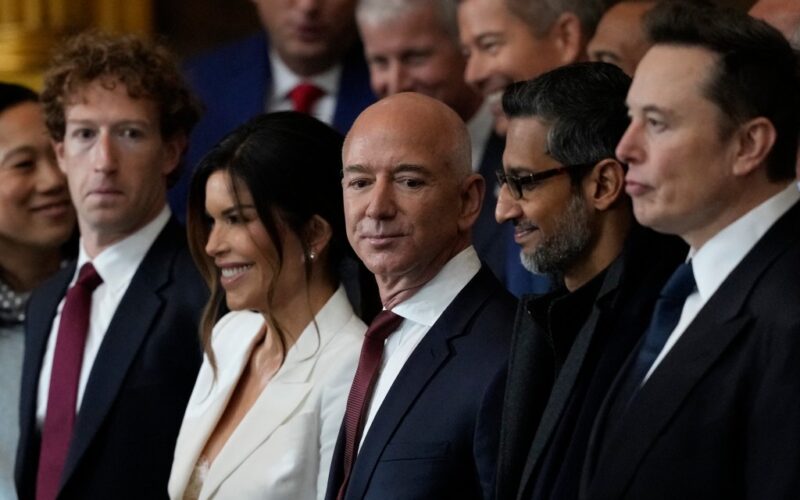Billionaires, beware: Thousands of your countrymen are focusing hard on reining in your riches. All of them, including large numbers of millionaires, want you to pay higher taxes. They want a 21st century America with less income inequality and more tax fairness.
Something like the America of decades ago, before the laws started leaning toward high-income taxpayers. (And they’re still leaning that way: see the gifts handed out to the rich in the One Big Unbeautiful Bill rammed through by the GOP earlier this year).
The opponents of billionaires include tax experts, scholars, investigative journalists, Democratic lawmakers, and two groups devoted especially to tax reform. One is Patriotic Millionaires, self-defined as “a collection of wealthy Americans fighting against the destabilizing concentration of wealth and power in the United States.” The other has a name that needs no definition, Tax the Greedy Billionaires. Rep. Greg Casar sums up its mission in eight words: “Tax the billionaires instead of funding the billionaires.”
Here are a few glimpses of what they’re all seeing — and what they’d like to be seeing instead.
Patriotic Millionaires underscores the country’s growing inequality and a tax code that deserves most of the blame: “Those who are already rich can make money in ways that are subject to income taxes at lower rates or don’t count as ‘income’ at all.” As a result, “Billionaires now pay lower effective tax rates than all other income groups.” Because of this, “The U.S. tax system has enabled a concentration of wealth so extreme that it threatens our economy, our democracy and the planet.”
Tax the Greedy Billionaires sounds an equally loud alarm. “America’s wealth inequality has reached a dangerous tipping point. The richest Americans have captured our government, rigging the rules in their favor and amassing unprecedented concentrations of wealth and power….The American Dream can’t survive in a system where unlimited wealth for the few destroys opportunity for all.”
Real estate multimillionaire Kimberly Hoover will benefit hugely from the One Big Unbeautiful Bill, but she’s not happy. “At some point, it starts to feel wrong. It starts to feel somehow inappropriate….Imbalanced is not really good for anyone, even if you’re on the positive end of that imbalance.”
The independent newsroom ProPublica named names and detailed the details in a bombshell piece, “How Billionaires Have Sidestepped a Tax Aimed at the Rich.” One of the named names was Jeff Yass, a Republican megadonor “who sits atop one of the most profitable trading firms in the world”.
Yass was particularly successful in gaming the Net Investment Income Tax (NIIT), a tax crafted to target traders like him. But that wasn’t all; in 2013 and 2014, he also wiped out “hundreds of millions in interest and dividend income.”
Ron Wyden is the ranking member of the Senate Finance Committee. He spoke for all the reformers in a statement that included these words: “To the nurse or the janitor whose taxes come straight out of their paychecks, it’s ridiculous to see these examples of fabulously wealthy individuals enjoying huge windfalls and continuing to avoid paying a fair share.”
Law Prof. Brian Galle thinks he has a better idea for taxing the rich than the minimum income tax proposed by the Biden administration. He would adjust the capital gains tax rate so that it increases the longer an asset is held. Galle calls it FAST, or Fair Share Tax. He believes it could be designed to yield just as much revenue as any other option, and would be easier to implement as well. (Currently, of course, the long-term capital gains tax is less than the tax on wages — one more example of a tax law favoring the rich).
Gabriel Zucman is a leading champion of taxing the rich to reduce inequality. He’s a professor both here and abroad, at the Paris School of Economics and the University of California at Berkeley. Zucman readily acknowledges the failure of earlier attempts, like former President Biden’s, to make the rich pay more. At the same time, “The odds [for success] are good even if the timing is uncertain….Fiscal history is full of U-turns.”
Lastly, just a couple of months ago, lawyer and tax reformer Bob Lord gave us an eye-opening perspective: “The top 3 U.S. oligarchs now sit on $992 billion. The age of trillionaires is upon us. For context, $1 trillion is over $1 million per day since Jesus died.”
Summing up, future congresses will need to choose between raising taxes on the super-rich or continuing to make them even richer. To put it emotionally, thousands of reformers are certain to end up crying — crying either tears of joy or tears of sorrow.
Scorse writes on taxes.








